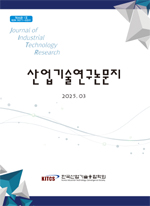LNG 연료 기반 자동차 제조 공정의 에너지 효율 분석 모델(AL-EEM) 연구
Energy Efficiency Analysis Model (AL-EEM) for LNG-Based Automobile Manufacturing Processes
- 한국산업기술융합학회(구. 산업기술교육훈련학회)
- 산업기술연구논문지
- 제30권 3호
-
2025.09173 - 178 (6 pages)
-
DOI : 10.29279/jitr.k.2025.30.3.173
- 0

본 연구는 LNG 연료 도입이 확대되고 있는 자동차 제조 공정을 대상으로, 실제 운전 데이터에 기반한 에너지 효율 분석 프레임워크인 AL-EEM(Automobile Manufacturing Process LNG Energy Efficiency Model)을 제안하고그 유효성을 검증하는 것을 목적으로 한다. 이를 위해 에너지 보존 법칙에 근거한 정적 모델과 회귀분석 및 미적분을 활용한 동적 모델을 통합적으로 적용하였으며, 국내 한 자동차 공장의 1년간 SCADA 데이터를 분석에 활용하였다. 약 5,840개의 시간별 운전 데이터 전체를 통계 분석하여 산출한 연평균 운전 실적값인 응축수 회수율 약50%, 급수온도 87℃를 반영하여 분석 결과, 시스템의 연평균 총괄 에너지 효율은 87.5%로, 이는 매우 우수한 성능 수준임을 확인했다. 또한, 동적 모델 분석을 통해 에너지 변수 간의 비선형적 관계와 한계 효율을 분석하여, 에너지 효율이 극대화되는 최적 운영점을 도출하는 방법론을 제시하였다. 본 연구에서 제안한 AL-EEM은 산업 시스템의 정적 효율성뿐만 아니라 동적 운영 특성까지 심도 있게 분석하여, 데이터 기반의 지능적인 에너지 관리 및 최적화에 기여할수 있을 것으로 기대된다.
An efficiency analysis framework called Automobile Manufacturing Process LNG Energy Efficiency Model (AL-EEM) was developed and validated for an automobile manufacturing plant where LNG fuel adoption is expanding. AL-EEM is based on actual operational data. The model integrates a static model grounded in the law of conservation of energy with a dynamic model that uses regression analysis and calculus. One year of SCADA data were used from a domestic automobile plant for the analysis. The obtained annual average operational values included a condensate recovery rate of 50% and a feedwater temperature of 87 °C, which were derived from approximately 5,840 hourly data points. The overall annual average energy efficiency of the system was high at 87.5%. Furthermore, the nonlinear relationships and marginal efficiencies among energy variables were determined through dynamic model analysis, provide a methodology for identifying the optimal operating point that maximizes energy efficiency. The proposed AL-EEM framework will substantially contribute to data-driven, intelligent energy management and optimization through enabling in-depth analyses of static efficiency and the dynamic operational characteristics of industrial systems.
Ⅰ. 서 론
Ⅱ. 연구 방법론 및 모델 설계
Ⅲ. 결과 및 논의
References
(0)
(0)